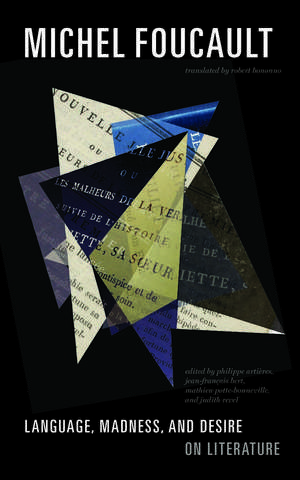Language, Madness, and Desire: On Literature
Autor Michel Foucault Editat de Philippe Artières, Jean-François Bert, Mathieu Potte-Bonneville, Judith Revel Traducere de Robert Bononnoen Limba Engleză Paperback – 7 dec 2021
As a transformative thinker of the twentieth century, whose work spanned all branches of the humanities, Michel Foucault had a complex and profound relationship with literature. And yet this critical aspect of his thought, because it was largely expressed in speeches and interviews, remains virtually unknown to even his most loyal readers. This book brings together previously unpublished transcripts of oral presentations in which Foucault speaks at length about literature and its links to some of his principal themes: madness, language and criticism, and truth and desire.
The associations between madness and language—and madness and silence—preoccupy Foucault in two 1963 radio broadcasts, presented here, in which he ranges among literary examples from Cervantes and Shakespeare to Diderot, before taking up questions about Artaud’s literary correspondence, lettres de cachet, and the materiality of language. In his lectures on the relations among language, the literary work, and literature, he discusses Joyce, Proust, Chateaubriand, Racine, and Corneille, as well as the linguist Roman Jakobson. What we know as literature, Foucault contends, begins with the Marquis de Sade, to whose writing—particularly La Nouvelle Justine and Juliette—he devotes a full two-part lecture series focusing on notions of literary self-consciousness.
Following his meditations on history in the recently published Speech Begins after Death, this current volume makes clear the importance of literature to Foucault’s thought and intellectual development.
The associations between madness and language—and madness and silence—preoccupy Foucault in two 1963 radio broadcasts, presented here, in which he ranges among literary examples from Cervantes and Shakespeare to Diderot, before taking up questions about Artaud’s literary correspondence, lettres de cachet, and the materiality of language. In his lectures on the relations among language, the literary work, and literature, he discusses Joyce, Proust, Chateaubriand, Racine, and Corneille, as well as the linguist Roman Jakobson. What we know as literature, Foucault contends, begins with the Marquis de Sade, to whose writing—particularly La Nouvelle Justine and Juliette—he devotes a full two-part lecture series focusing on notions of literary self-consciousness.
Following his meditations on history in the recently published Speech Begins after Death, this current volume makes clear the importance of literature to Foucault’s thought and intellectual development.
Preț: 130.89 lei
Nou
Puncte Express: 196
Preț estimativ în valută:
25.05€ • 25.82$ • 21.15£
25.05€ • 25.82$ • 21.15£
Carte disponibilă
Livrare economică 10-24 februarie
Livrare express 24-30 ianuarie pentru 18.21 lei
Preluare comenzi: 021 569.72.76
Specificații
ISBN-13: 9781517912772
ISBN-10: 1517912776
Pagini: 176
Dimensiuni: 127 x 203 x 18 mm
Greutate: 0.2 kg
Editura: University of Minnesota Press
Colecția Univ Of Minnesota Press
ISBN-10: 1517912776
Pagini: 176
Dimensiuni: 127 x 203 x 18 mm
Greutate: 0.2 kg
Editura: University of Minnesota Press
Colecția Univ Of Minnesota Press
Notă biografică
Michel Foucault (1926–1984) was a French historian and philosopher associated with the structuralist and poststructuralist movements, whose work has been widely influential throughout the humanities and social sciences. Some of his most notable titles are Madness and Civilization, Discipline and Punish, and The History of Sexuality.
Robert Bononno has been a translator from French for more than twenty years. His recent nonfiction translations include Toward an Architecture of Enjoyment, by Henri Lefebvre (Minnesota, 2014), and Speech Begins after Death, by Michel Foucault and Claude Bonnefoy (Minnesota, 2013).
Robert Bononno has been a translator from French for more than twenty years. His recent nonfiction translations include Toward an Architecture of Enjoyment, by Henri Lefebvre (Minnesota, 2014), and Speech Begins after Death, by Michel Foucault and Claude Bonnefoy (Minnesota, 2013).
Cuprins
Contents
Editors’ Introduction
Note on the Text
Language, Madness, and Desire
Language and Madness
The Silence of the Mad
Mad Language
Literature and Language
Session One: What Is Literature?
Session Two: What Is the Language of Literature?
Lectures on Sade
Session One: Why Did Sade Write?
Session Two: Theoretical Discourses and Erotic Scenes
Editors’ Notes
Editors’ Introduction
Note on the Text
Language, Madness, and Desire
Language and Madness
The Silence of the Mad
Mad Language
Literature and Language
Session One: What Is Literature?
Session Two: What Is the Language of Literature?
Lectures on Sade
Session One: Why Did Sade Write?
Session Two: Theoretical Discourses and Erotic Scenes
Editors’ Notes
Recenzii
"Connotatively exhilarating." —CHOICE
